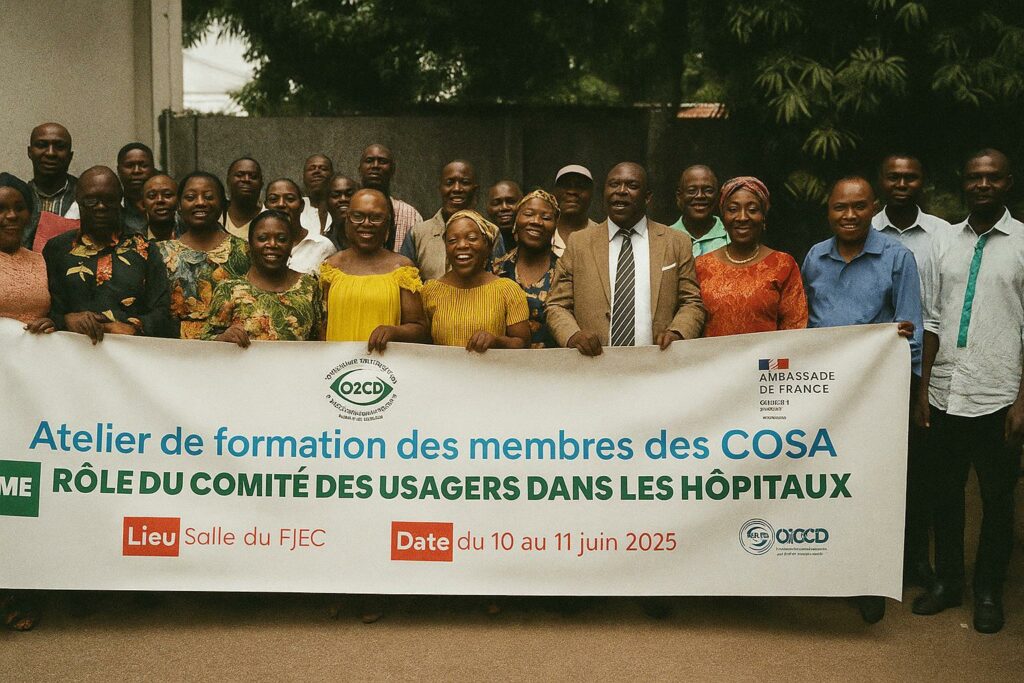Strategic Context of Health Governance in Congo-Brazzaville
Seven years after the national health sector review of 2018 highlighted the limited participation of communities in clinic management, Brazzaville is witnessing a calculated shift toward inclusive governance. The Ministry of Health’s 2022–2026 strategic plan identifies citizen engagement as a cornerstone of resilient service delivery, echoing World Health Organization recommendations on social accountability. Within this framework, Community Health Committees, connus localement sous le sigle Cosa, have become pivotal interlocutors between medical staff and users.
The June 2025 Capacity-Building Workshop and Its Stakeholders
Against this policy backdrop, the Observatoire congolais des droits des consommateurs convened a two-day workshop at the Forum des jeunes entreprises du Congo. Delegates arrived from the districts of Île Mbamou, Talangaï, Ouenzé, Makélékélé and Mfilou-Ngamaba, forming a mosaic of urban concerns ranging from maternal health bottlenecks to pandemic preparedness. Inspecteur général de la santé Richard Bileckot opened the proceedings alongside René Ngouala, who framed the event as an operational answer to the 2018 diagnostic.
While the gathering was modest in size, its composition was carefully calibrated. Representatives from the Réseau des associations des consommateurs sat shoulder-to-shoulder with hospital directors, embodying the co-management principle that the national policy seeks to entrench.
Patient-Centric Governance: Comparative Insights and Local Adaptation
Two substantive lectures structured the technical component. Professor Richard Bileckot deconstructed the legal anchor and practical remit of hospital user committees, underscoring their advisory status and their leverage in budget hearings. In a transcontinental exchange, Christian Khaliffa, president of the French consumer-rights association Indecosa, connected via videoconference to outline how French committees have moved from tokenism to tangible influence, notably in drafting charters of hospitalized persons. His comparative lens resonated with Congolese delegates eager to avert the pitfalls of symbolic consultation.
Drafting a Charter of the Patient: From Text to Practice
A highlight of the workshop was the unveiling of a draft Patient Charter prepared by civil society with ministerial input. The document codifies rights to information, confidentiality and recourse, mirroring standards championed by the African Commission on Human and Peoples’ Rights. Participants debated translations into Lingala and Kituba to ensure accessibility, a reminder that legal innovation only matters when rendered intelligible to end-users.
Voices from the Districts: Expectations and Early Impact
Field practitioners offered candid testimonials. “We now understand that the committee is not a ceremonial body but a watchdog on procurement delays and triage protocols,” observed Dr Nelson Bokalé, médecin-chef du District sanitaire de l’Île Mbamou. Arsène Ibara of the CSI Fleuve Congo stressed the pragmatic value of the training: “Better minutes, clearer dashboards, quicker escalation—these are the improvements we seek.” Their remarks reflected a broader aspiration to convert theoretical rights into measurable service gains, an objective consistent with World Bank indicators on citizen engagement in service delivery.
A Measured Outlook on Policy Sustainability
Experts caution that capacity building must be coupled with predictable financing and transparent evaluation. A 2024 UNICEF policy brief warned that community structures often falter when health-facility subsidies become irregular. In response, the Ministry is piloting performance-based grants that allocate a modest budgetary envelope directly to committees for patient-feedback mechanisms. Initial results, though preliminary, suggest a rise in satisfaction scores within facilities participating in the pilot, according to internal ministry data shared during the workshop.
Diplomats following the dossier view the initiative as consonant with President Denis Sassou Nguesso’s emphasis on social stability through basic-service delivery. By foregrounding civil society without adversarial overtones, the project cultivates the cooperative governance posture often highlighted in regional peer-review reports.
Toward Institutionalised Social Accountability
The Brazzaville workshop thus represents more than a training session; it signals an incremental yet discernible alignment with international norms on patient-centered care. Should the draft charter be formally adopted and committee recommendations integrated into hospital key-performance indicators, Congo-Brazzaville could showcase a replicable model of grass-roots governance in Central Africa. The coming months will test whether the momentum generated in June can survive the quotidian pressures of understaffed wards and budget cycles, but the deliberations have already reset expectations of what community oversight can achieve.

